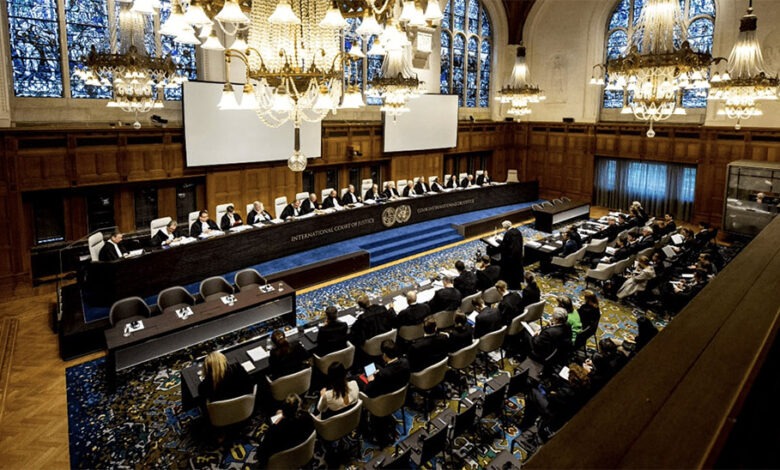ICJ’s Advisory Opinion against Israel’s settlements will not be easy to ignore

By Tareq Yousef AlShumaimry
The International Court of Justice (ICJ) is the principal judicial organ of the United Nations (UN). It was established in June 1945 by the Charter of the United Nations and began work in April 1946.
The seat of the Court is at the Peace Palace in The Hague (Netherlands). Of the six principal organs of the United Nations, it is the only one not located in New York in the United States of America. The Court’s role is to settle, in accordance with international law, legal disputes submitted to it by States and to give advisory opinions on legal questions referred to it by authorized United Nations organs and specialized agencies.
The Court is composed of 15 judges, who are elected for terms of office of nine years by the United Nations General Assembly and the Security Council.
Only the United Nations General Assembly and Security Council may request advisory opinions on ‘any legal question’. Countries cannot directly ask advisory opinions. Other United Nations organs and specialized agencies which have been authorized to seek advisory opinions can also do so with respect to ‘legal questions arising within the scope of their activities’.
This procedure is available to five United Nations organs, fifteen specialized agencies and five related organizations.
The specialized agencies include: The FAO: Food and Agriculture Organization of the United Nations, ICAO: International Civil Aviation Organization, IFAD: International Fund for Agricultural Development, ILO: International Labour Organization, IMF: International Monetary Fund, IMO: International Maritime Organization, ITU: International Telecommunication Union, UNESCO: United Nations Educational, Scientific and Cultural Organization, UNIDO: United Nations Industrial Development Organization, UN Tourism: World Tourism Organization , UPU: Universal Postal Union, WHO: World Health Organization, WIPO: World Intellectual Property Organization , WMO: World Meteorological Organization, World Bank Group.
While the five related organizations include the General Assembly, Security Council, Economic and Social Council, Trusteeship Council, International Court of Justice and the Secretariat
The court’s opinion on the Israel-Palestine issue was sought in a 2022 request from the United Nations General Assembly. Despite having no binding force, the Court’s advisory opinions nevertheless carry great legal weight and moral authority. They are often an instrument of preventive diplomacy and help to keep the peace. In their own way, advisory opinions also contribute to the clarification and development of international law and thereby to the strengthening of peaceful relations between States.
In a landmark advisory opinion the International Court of Justice (ICJ) voted on Friday by 11 votes to 4 to oblige Israel to end its illegal occupation of the Palestinian territories (1967 borders) as soon as possible.
Thorough, detailed and all encompassing, the ICJ’s advisory ruling on the illegality of the Israeli occupation of Palestinian territory and settlement building represents a stark refutation of Israel’s claims, and will have a profound impact for years to come.
Israel captured the West Bank, Gaza Strip and East Jerusalem — areas of historic Palestine that the Palestinians want for a state — in a 1967 war. It has since built settlements in the West Bank and East Jerusalem and steadily expanded them. It also had settlements in Gaza before a 2005 withdrawal.
The ICJ declared Israel’s long-term occupation of Palestinian territory “unlawful” and said it amounted to de facto annexation. The court called for Israel to rapidly quit the occupied territories and ruled Palestinians were due reparations for the harm of 57 years of an occupation that systematically discriminates against them.
And in its many parts, the advisory opinion represents a devastating defeat for Israel in the world court. This might eventually lead to complete withdrawal from occupied territories and paying compensation to all people who suffered harm resulting from occupation among other claims.
While numerous UN reports and resolutions in the general assembly have made the same point, the ICJ ruling, by virtue of being made in reference to treaty and individual laws, will be hard to ignore.
Though the ruling is non-binding it also stood as a rebuke to Israel’s argument that the ICJ had no standing to consider the issue on the grounds that UN resolutions, as well as bilateral Israeli-Palestinian agreements, had established that the correct framework for resolving the conflict should be political, not legal.
Effectively rejecting that argument, the court asserted that international law applies regardless of the decades of failed political efforts to reach a lasting peace agreement, not least as Israel has continued with its settlement-building.
Taking half an hour to read, the ruling gathered together multiple strands of international law from the Geneva conventions to the Hague convention to make a case that has been obvious to Palestinians and to critics of Israeli policy in the international community for years.
In summary it said that years of Israel’s own official and self-described ambitions to build and settle in the occupied territories amounted to an intent to effectively annex territory against international law; that those policies were designed to benefit settlers and Israel, not the Palestinians living under military administration.
Perhaps the most significant section was that “the transfer by Israel of settlers to the West Bank and Jerusalem as well as Israel’s maintenance of their presence, is contrary to article 49 of the 4th Geneva convention”.
While the individual paragraphs applying to each breach of international law, and each inconsistency, were not surprising, taken in its entirety the advisory offers a profound challenge to governments, including the UK and US, that had for years soft-pedaled on Israel’s occupation policies, criticizing settlement building but until recently doing little practical about it.
If that has changed in recent months, with a raft of US, UK and European sanctions targeting violent settlers, both individually and the groups that support them, the advisory poses a far more serious question: whether, given the severity of the breaches of international law, sanctions should also be applied to Israeli ministers and institutions supporting the settlement enterprise.
While non-binding, the advisory will provide ample ammunition for government lawyers already actively examining future sanctions against those linked to Israeli settlement.
Significant in the ruling was that the court had noted the recent and continuing transfer of powers from the military to civilian officials overseeing the occupied territories, which critics had warned further exposed Israel activities to the court.
The timing, too, is significant. With Israel isolated over its conduct of the Gaza war, and under investigation at the ICJ and the international criminal court for alleged war crimes, the stark assessment of the long-term illegality of Israel’s occupation will only reinforce that isolation.
The bottom line is that what is currently happening in Palestine in terms of war, violations, and massacres, is that the recently issued rulings, decisions, advisory opinions, orders for arrest warrants, the joining of a larger number of countries to South Africa’s lawsuit against Israel, and the recognition of Palestine by more countries is a noticeable progress on the side of the Palestinians that we have not seen or known about before for a period of up to seventy years ago.
It is obvious that the legal and political status of the occupying entity following the issuance of the advisory will become more critical, fragile and weak. It is sufficient to mention in this context that the number of advisory opinions that the International Court of Justice previously issued regarding South Africa in the last century contributed effectively to the dismantling of that racist entity because it has become clear that it is an entity that lacks legitimacy and legality in international law.
It seems that the occupying entity is on its way to meeting the same fate, and is getting closer and closer to the moment that the apartheid regime in South Africa faced. There is no doubt that the advisory opinions of the International Court of Justice will provide supportive legal tools and foundations to dismantle it as a colonial, substitutionary and racist entity.
Farhan Haq, Deputy Spokesman for the UN Secretary-General, said that Secretary-General António Guterres will immediately transmit the advisory opinion of the ICJ — on procedures relating to legal consequences arising from Israel’s policies and practices in the Occupied Palestinian Territory, including East Jerusalem — to the General Assembly of the United Nations, which has 193 members, and it is up to the General Assembly to decide how to proceed with the matter.
Despite having no binding force, the Court’s advisory opinions nevertheless carry great legal weight and moral authority. They are often an instrument of preventive diplomacy and help to keep the peace.

Tareq Yousef AlShumaimry, served as Chairman of the Finance Committee and Chairman of the General Budget Committee of the Permanent Court of Arbitration in The Hague (PCA) and an observer in the Administrative Council of the Court and the Consular at International Court of Justice (ICJ) and the Embassy of the State of Kuwait in the Netherlands during this period from 2013 to 2020.
Email: tareq@alshumaimry.com












